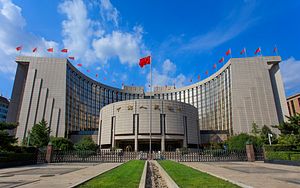The Rebalance authors Mercy Kuo and Angie Tang regularly engage subject-matter experts, policy practitioners and strategic thinkers across the globe for their diverse insights into the U.S. rebalance to Asia. This conversation with William H. Overholt – Senior Fellow at Harvard University’s Asia Center and an author of Renminbi Rising: The Emergence of a New Global Monetary System, as well as Asia, America and the Transformation of Geopolitics, among others – is the 28th in “The Rebalance Insight Series.”
In Renminbi Rising: A New Global Monetary System Emerges, you posit three requirements to become a global heavyweight: a large and growing domestic economy; substantial and open capital markets; and trusted and effective institutions to manage the economy and markets. Briefly rate China’s progress on all three fronts.
China’s economy is already large, larger than the U.S. in purchasing power, but it is growing more slowly than official numbers or most commentary suggest. To make its capital markets “substantial” compared with the U.S., China must unify its bond market, currently fragmented by four inconsistent regulators. In addition, China should transform much local government debt into central government bonds. These will likely happen but have not yet begun. China has made progress in opening its capital markets, but they are still less open than countries like India. It has hit a bottleneck, because capital outflows exceeding $900 billion in 2015 indicate that full opening could facilitate massive capital flight and destabilize the currency and financial systems. China’s wealthy families are trying to get their money out – that will slow the opening of capital markets.
On institutions: The central bank, People’s Bank of China (PBOC), has become an internationally respected market regulator. The banking regulator, China Banking Regulatory Commission (CBRC), has demonstrated its ability to restructure the banking system and impose improving standards. The stock market regulator, China Securities Regulatory Commission (CSRC), is experiencing serious growing pains typical of new markets. The RMB’s biggest institutional challenge is China’s legal system. If other countries are going to make themselves dependent on RMB reserves in a crisis, they will demand assurance that disputes will be adjudicated by an objective, transparent legal process.
Your research methodology explored alternative scenarios for the RMB’s global trajectory. What key variables could derail or complicate the RMB’s internationalization process?
The RMB’s rise would be hobbled by a failure to implement economic reforms decisively, political discontinuity, or accelerating capital flight.
Which state and non-state actors are primary stakeholders in the emergence of this new global monetary system?
RMB globalization’s success would greatly benefit the Chinese economy and the Chinese government. As others, China has suffered from being tied to U.S. dollars during periods of financial crisis and dollar weakness. More importantly, China is using RMB internationalization to force market reforms in its domestic economy – currency, capital market opening, interest rates, and banking reform. The global financial centers will be major beneficiaries, with Hong Kong, Singapore and London gaining most. Toronto has at least temporarily outflanked inattentive New York, which might catch up later. Tokyo’s relative decline accelerates.
Major international banks, most notably HSBC, and global companies such as Samsung will win, more than their more provincial Chinese counterparts. The big loser is Washington, not because RMB internationalization harms the U.S. but because U.S. political leaders have refused to adapt to the modern world. The U.S. Congress refused to modernize the World Bank and IMF, thereby ensuring the rise of new institutions. The Obama administration then refused to join the Asian Infrastructure Investment Bank (AIIB), thereby ensuring for now that the U.S. would lack influence in the new, cumulatively larger institutions.
As an exercise in futures analysis, what key indicators will signal that the RMB has reached parity with the U.S. dollar as a preferred trading currency?
The RMB has become very important in trade finance, with a nine percent share in 2013, but the U.S. dollar (USD) still commanded 81 percent. Those figures will not reverse soon. In currency trading, the RMB was ninth in 2013, with one percent of global trades while the USD had 44 percent; China might just make it to number five by 2020. As a reserve currency, China will not be a challenger for decades. The rise of the RMB is very important, but reports of the obsolescence of the USD are very premature.
Labeling China as a “currency manipulator” is a default rhetorical tool of U.S. presidential candidates on the campaign trail. What two critical implications of the RMB’s rise confront the next U.S. president?
To retain monetary leadership, and to sustain a unified global monetary system, the next U.S. administration must quickly improve the capital and governance of the Bretton Woods institutions and join the AIIB. To be taken seriously by the rest of the world, the U.S. needs to get its politicians to eschew the dishonest rhetoric about currency manipulation and its effect on the U.S. economy. Over two decades the RMB has appreciated more than 60 percent in real effective terms, more than any other emerging market currency. Rapidly rising Chinese wages have magnified the effects of that appreciation. For four years the RMB has been well within the range the IMF uses to judge a fairly valued currency – trade surplus of 4 percent or less – and recently it has been clearly overvalued. The Chinese authorities have spent a sixth of China’s reserves in less than half a year to keep the RMB overvalued. In 2015 the IMF formally announced that the currency was not undervalued. But U.S. politicians continue to denounce China for predatory undervaluation. Such nonsense eventually leads our allies to walk away, as most did on the AIIB decision.
Mercy A. Kuo is an advisory board member of CHINADebate and was previously director of the Southeast Asia Studies and Strategic Asia Programs at the National Bureau of Asian Research. Angie O. Tang is Senior Advisor of Asia Value Advisors, a leading venture philanthropy advisory firm based in Hong Kong.

































